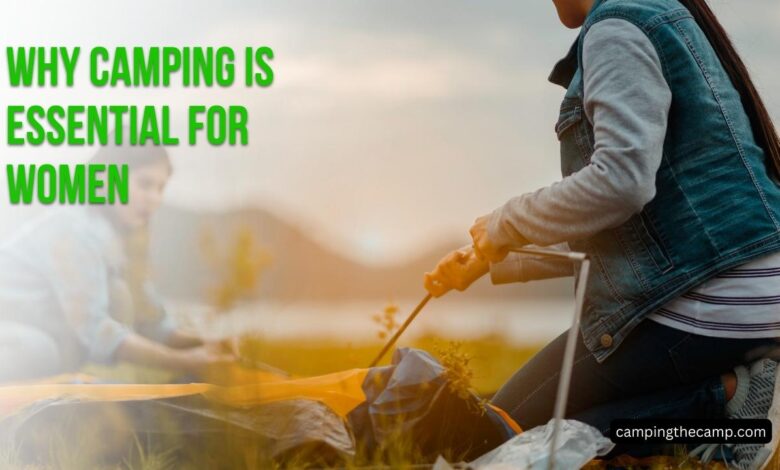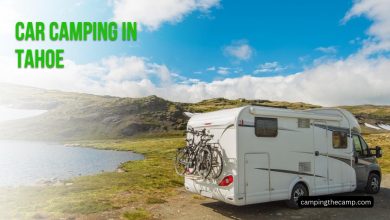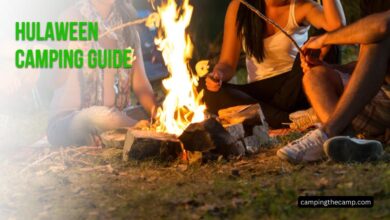Unleashing the Beauty of Female Camping Adventures

Female Camping is a popular outdoor activity people of all ages and genders enjoy. However, female camping has become a growing trend as more women seek to explore the great outdoors and connect with nature. Female camping offers a unique opportunity for women to bond with one another, learn new skills, and challenge themselves in a safe and supportive environment. Female camping provides an empowering, enriching, fun, and educational experience. Women can form strong connections with nature, build self-confidence and independence, and develop valuable survival skills. So, if you’re a woman who loves adventure, exploring new places, and making new friends, then female camping might just be the perfect activity for you.
Why camping is essential for women
Camping can be an essential activity for women for many reasons. Here are a few reasons why camping is important for women:
Connection with nature: Spending time outdoors in nature can give women peace and relaxation and help them connect with the natural world. This connection can be grounding and offer a break from the stresses of daily life.
Self-reliance and independence: Camping can help women build self-reliance and independence by learning to set up camp, cook meals, and navigate in the wilderness. This sense of accomplishment and self-sufficiency can be empowering and boost self-confidence.
Bonding with others: Camping provides an opportunity to bond with other women, whether with friends, family members, or fellow campers. This bonding can strengthen relationships and create lasting memories.
Mental and physical health benefits: Being outdoors in nature has been shown to affect mental and physical health positively. Camping can allow women to disconnect from technology and engage in activities that promote physical activity and stress relief.
Adventure and exploration: Camping allows women to explore new places, try new things, and challenge themselves. This sense of adventure can be refreshing and lead to personal growth.
Overall, camping can give women a sense of adventure, independence, and connection with nature, positively impacting their mental and physical health. By planning and preparing, women can enjoy a safe and comfortable camping experience that allows them to disconnect from the stresses of daily life and connect with the natural world.
Related: Mt Madonna Camping
9 Safety Tips for Solo Female Camping
Choose the right location.
When planning a female camping trip, selecting the right location is crucial. Some essential factors are whether you prefer the wilderness or a designated campsite.
If you embark on a solo camping trip for the first time, opting for an established campsite is advisable. This will allow you to experience the solitude of camping alone while still having the company of other campers and access to site officials nearby. To find the perfect campsite, browse online, read reviews, and check the available facilities.
For those who choose to camp in the wilderness, it’s important to take extra precautions. Look for a secluded spot not too far from a well-known trail or path. This way, you can keep your bearings and have a quick escape route if necessary.
Confide in your plans with family and friends.
It’s important to confide in someone you trust, such as a family member or friend, about your camping plans. Make sure to provide them with details of your location, itinerary, and expected timeline.
Arrange pre-set check-in times via phone call or text message if you have a phone signal. Additionally, if you are staying at a designated campsite, share the contact information of the campsite owners with your trusted confidant.
For added safety measures, you could also establish a code word to be used over the phone or via text in case of any uncomfortable situations arising.
Don’t advertise your location.
It is important to be cautious about who you share your camping details with. Only share your plans with people you trust, and avoid posting about your trip on social media until after it occurs. When chatting with others, be mindful of how much information you share. It is always better to prioritize safety by erring on the side of caution.
Check the weather
Checking the weather forecast is essential when preparing for a camping trip. It can greatly impact the type of gear and equipment you’ll need to bring along. Be sure to pack appropriately for the specific weather conditions you’ll be camping in, whether rain or shine. If you’re camping in areas with unpredictable weather patterns, it’s best to be prepared for all possible scenarios to ensure a safe and enjoyable camping experience.
Ensure you’ve plenty of daylight.
It’s important to plan your camping schedule to ensure you have plenty of daylight hours during your trip. Starting early in the morning and leaving early in the evening will maximize the amount of daylight available. This is especially important when wild camping, as setting up or taking down your tent during the day is safer and more convenient. Daylight hours also provide ample time to check the area and become familiar with your surroundings before nightfall. Without artificial lighting, the darkness of night can be disorienting, so it’s best to use daylight hours as much as possible.
Listen to your intuition.
You are trusting your intuition while camping is important, as uncomfortable situations can arise even in the most enjoyable experiences. If something doesn’t feel right, don’t hesitate to prioritize safety over any social awkwardness.
In such situations, it’s best to take action that gives you peace of mind, whether calling a friend, changing camping locations, contacting campsite owners, or even sleeping in your car. Over the years, I have never regretted prioritizing safety and bailing on situations that didn’t feel right. In hindsight, it doesn’t matter whether my instincts were accurate, as my safety always takes priority, especially when camping alone.
Protect yourself with the right equipment.
Having the right equipment can provide security and peace of mind while camping. Stay prepared and protect yourself with the correct gear if you need to protect yourself from a potential threat.
Investing in deterrents like an airhorn, a rape alarm, or a bright head torch/flashlight can be useful in the unlikely event of an encounter with a stranger or wild animal. These items can help you defend yourself and deter potential threats, protecting your camping trip.
Build confidence with self-defense.
Defending yourself can greatly increase your confidence while camping alone as a woman. An effective self-defense system can empower and provide security for women from all backgrounds.
Brazilian Jiu-Jitsu (BJJ) is widely recognized as one of the most effective self-defense systems for women, particularly the Gracie self-defense system. BJJ gyms can be found worldwide, making it a convenient option for many. Even just taking a few classes can profoundly affect your psyche, providing a real confidence boost when camping alone. Building confidence through self-defense training can help women feel more comfortable and secure in various situations, including camping trips.
Have a women’s solo camping checklist
If you’re a woman looking for a comprehensive camping checklist, I highly recommend reading my latest blog post, “Women’s Camping Essentials – Must-Have Items for Solo Camping!” It covers all the necessary items you need to bring along for a successful solo camping trip.
20 Camping Essentials for Women
Camping can be an incredible adventure for women to escape from their daily routine, connect with nature, and create unforgettable memories. However, packing the right gear and essentials ensures a safe, comfortable, and enjoyable experience. Here are 20 camping essentials for women to consider:
Tent:
A reliable and spacious tent is important
- You always try to keep dry and
- Try to protect yourself from the elements.
Sleeping bag:
A good quality sleeping bag rated for the expected temperature range will keep you warm and comfortable while sleeping.
Sleeping pad:
A comfortable and insulating sleeping pad will provide extra comfort and insulation from the cold ground.
Backpack:
A well-designed backpack with padded shoulder straps and a hip belt is essential to carry your camping gear comfortably.
Water bottles:
Water bottles can help us to stay hydrated, and reusable water bottles will help to reduce plastic waste.
Headlamp or flashlight:
These lighting sources will help you navigate the campsite and perform tasks in the dark.
Multi-tool or knife:
These tools help cut ropes, prepare food, and repair gear.
Map and compass:
These tools will help you navigate and orient yourself in unfamiliar terrain.
Sun protection:
Sunscreen, hat, and sunglasses are necessary to protect skin & eyes from harmful UV rays.
Insect repellent:
A good quality insect repellent will keep bugs and mosquitoes away.
First aid kit:
A comprehensive kit is necessary to treat minor injuries and medical emergencies.
Firestarter:
Matches or a lighter will help you start a fire to cook food or keep warm.
Cooking equipment:
Pots, pans, utensils, and a portable stove are necessary to cook food while camping.
Food and snacks:
Pack non-perishable foods that require minimal cooking and snacks to fuel your adventures.
Clothing:
Pack comfortable and moisture-wicking clothes appropriate for the expected weather conditions.
Footwear:
Sturdy and comfortable hiking boots or shoes with good traction are essential for hiking and exploring.
Personal hygiene items:
Toothbrush, toothpaste, biodegradable soap, wet wipes, and toilet paper are necessary to maintain hygiene.
Emergency whistle:
This will help you call for help in an emergency.
Trash bags:
Trash bags will help you clean your campsite and minimize environmental impact.
Entertainment:
Books, cards, and board games can help you relax and enjoy downtime while camping.
By packing these essentials, women can enjoy a safe, comfortable, and unforgettable camping experience that helps them connect with nature, build self-reliance, and make new friends.
Things Every Girl Should Bring Camping
Regarding camping, there are some essential items that every girl should pack to ensure a comfortable and enjoyable trip. These include a reliable tent, sleeping bag, sleeping pad, and appropriate clothing for the weather and activities planned. Other important items to pack include:
- A headlamp or flashlight.
- Portable charger.
- First-aid kit.
- Insect repellent.
- A good quality water bottle.
Additionally, it’s helpful to bring along easy-to-prepare meals, snacks, and a camp stove if needed. With these items, any girl can feel prepared and confident for a successful female camping trip.
What To Wear Camping Female
When planning what to wear for a camping trip, it’s important to consider the weather, the activities you’ll be doing, and the overall comfort and functionality of your clothing. Here are some suggestions for what women should wear when camping:
Base layers: Start with a moisture-wicking base layer, such as a tank top or t-shirt, to regulate body temperature and keep you dry.
Insulating layer: Depending on the weather, you may want to add an insulating layer such as a fleece or down jacket to keep you warm.
Outer layer: A waterproof or water-resistant jacket is essential in rain or inclement weather.
Pants: Opt for comfortable, durable pants that allow for a full range of motion. Hiking pants or leggings with a moisture-wicking fabric are good options.
Footwear: Choose sturdy, comfortable shoes or boots appropriate for the terrain you’ll be hiking on. Make sure to break them in before your trip to prevent blisters.
Accessories: Don’t forget to bring a hat, sunglasses, and gloves if necessary. And remember to pack extra socks and underwear!
Overall, prioritizing functionality and comfort while maintaining your style is the key to dressing for Female Camping.
Choosing Your Ideal Adventure – Solo Camping vs. Women’s Group Camping – Which Suits You Best
Both solo and group camping for women has unique advantages and disadvantages. It largely depends on your preferences, experience, and comfort level. Here are some factors to consider for each option:
Camping alone as a female:
Independence: Solo camping allows you to plan your trip according to your preferences and pace without compromising or negotiating with others.
Personal growth: Being alone in nature can be a great way to reflect, recharge, and develop self-reliance and problem-solving skills.
Flexibility: You can make spontaneous decisions and change your plans without affecting others.
However, solo camping may come with some challenges:
Safety: As a solo female camper, you should be extra cautious about your safety and take necessary precautions.
Loneliness: Camping alone can be isolating at times, especially if you enjoy the company of others.
Limited support: You must rely on your skills and resources in emergencies or difficulties.
Is it weird to go camping alone?
While solo camping might seem odd initially, it is perfectly normal and can become quite enjoyable after a few trips!
During your first solo camping experience, feeling out of your comfort zone and possibly struggling to sleep is common. However, with time, your mind and body will adapt to the experience, and you’ll feel more at ease.
Some people may perceive solo camping as strange, but it’s important to prioritize your happiness over the opinions of others.
How can I stop being scared of camping alone?
To overcome a fear of camping alone, it is best to take things one step at a time and avoid rushing into them.
Begin by gradually exposing yourself to camping experiences you feel comfortable with, then gradually increase the difficulty level with each trip.
For example, start by camping with a friend at a familiar campsite, then try solo camping at the same site. Next, you could attempt a wild camp near your home and gradually venture further away with each trip.
By taking these gradual steps, you’ll build confidence in your ability to camp alone and eventually do it easily!
Camping in a group for women:
Socializing: Group camping can be a great opportunity to bond with other women, share experiences, and make new friends.
Safety: Camping in a group can be safer, as more people can watch out for each other and provide support in emergencies.
Shared responsibilities: Group members can share tasks such as cooking, setting up camp, and navigating, making the experience more enjoyable and less tiring.
However, group camping may also have some downsides:
Compromises: You may have to adjust your plans and preferences to accommodate the needs and desires of the group.
Less personal space: Camping with others can mean less privacy and solitude, which could be a disadvantage if you seek alone time.
Group dynamics: Disagreements or conflicts may arise, affecting the overall experience.
Choosing between solo and group camping for women depends on your preferences and experience level.
FAQ
Is camping safe for women?
Yes, camping can be safe for women. Take necessary safety precautions, such as choosing a safe campsite, informing someone of your location and plans, carrying self-defense items, and being aware of your surroundings.
What should women pack for a camping trip?
Women should pack essential items for camping, including a tent, sleeping bag, camping stove, water filter, food, and appropriate clothing. Additionally, women should consider packing personal items such as hygiene products, sunscreen, insect repellent, and any necessary medication.
What are the best places for women to go camping?
There are many great places for women to go camping, including national parks, state parks, and private campgrounds. Researching the area and choosing a safe and secure campsite is important.
Can women go camping alone?
Yes, women can go camping alone. However, taking necessary safety precautions and informing someone of your location and plans is important.
How can women stay safe while camping?
Women can stay safe while camping by choosing a safe and secure campsite, informing someone of their location and plans, carrying self-defense items, and being aware of their surroundings. Following basic camping safety guidelines, such as keeping a clean campsite and properly storing food, is also important to avoid attracting wildlife.
What are some common mistakes women make when camping?
Some common mistakes women make when camping include not properly preparing for the trip, not bringing enough food or water, not packing appropriate clothing or gear, not researching the area and campsite beforehand, and not following basic camping safety guidelines. It is important to properly prepare for a camping trip to ensure a safe and enjoyable experience.
Can women camp while on their period?
Yes, women can camp while on their period. It is important to bring appropriate hygiene products and dispose of them properly. Additionally, women should consider packing pain relievers and any necessary medication.
What should women do if they encounter wildlife while camping?
Women should avoid approaching or feeding wildlife and keep a safe distance. It is important to store food to avoid attracting wildlife to the campsite properly. If a wildlife encounter does occur, women should remain calm, make noise to deter the animal, and slowly back away.
Is it safe to camp alone as a single woman?
Camping alone as a single woman can be safe if proper safety precautions are taken. Women should choose a safe and secure campsite, inform someone of their location and plans, carry self-defense items, be aware of their surroundings, and trust their instincts.
What are all the types of camping?
There are several types of camping, including:
- Tent camping
- RV Camping
- Car camping
- Backpacking
- Glamping
- Canoe camping
- Bicycle camping
- Kayak camping
- Motorcycle camping
- Winter Camping
- Beach camping
- Desert camping
- Forest camping
- Mountain camping
What is the most popular type of Female Camping?
Tent camping is often considered the most popular type of camping. It is a relatively affordable and accessible option and allows for a more immersive experience in nature.
Related: Pismo Beach Camping
Is it OK to go camping alone?
Yes, it is OK to go camping alone. However, it is important to take necessary safety precautions, such as choosing a safe and secure campsite, informing someone of your location and plans, carrying self-defense items, being aware of your surroundings, and trusting your instincts. It is also important to properly prepare for the trip and bring essential camping gear and supplies.




2 Comments